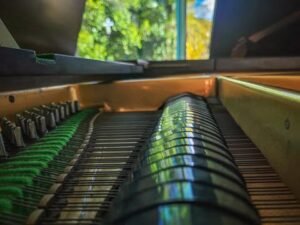Skills Developed Through Music
A variety of skills are enhanced by engaging with music, particularly when playing an instrument. This goes beyond the ability to make cool sounds or read sheet music, to everyday skills that will undoubtedly help you in academic settings.
Communication:
People often don’t consider the communicative elements of music. An instrumentalist must be simultaneously self-aware as well as aware of the ensemble and conductor in an orchestral environment. This trains focus, multi-tasking and listening skills, which are vital for academia. In group presentations, a successful presenter will express themselves, whilst collaborating with fellow presenters and observing audience interaction. Abilities gained through orchestral engagement translate well into that of presenting.
Western Sydney University alum Sami Beydoun has been a musician for 18 years. A Bachelor of Music graduate, Beydoun teaches music whilst completing AMEB examinations in classical guitar. He said music is inherently a communicative endeavour.
‘It’s about engaging with the flow of your music and people through listening, observing and self-expression. This awareness of yourself and others – akin to dialogue – is something I find relevant to how I engage with people in the day-to-day’, Beydoun said.
Critical Thinking:
The ability to think critically and problem solve is imperative to academic success.
‘The process of engaging with your instrument is one of cause, effect and feedback’; Beydoun said. ‘A musician must carefully observe the outcomes of their actions in practice and performance to understand their strengths and opportunities, and focus their attention accordingly’.
Playing an instrument exercises critical thinking and enhances problem-solving skills.
Physical Abilities:
Engaging with music often improves physical health in ways you may not expect.
Playing an instrument strengthens gross and fine motor skills, coordination and neurotransmission.
Drums are an instrument that, overtime, drastically improves gross motor skills and coordination. The understanding of causation, rhythm and muscle development that come with playing drums are unparalleled.
‘I’ve really enjoyed watching students achieve breakthroughs in their general coordination skill building’. Beydoun added. ‘It’s such a foundational aspect of their musical development and is no small feat in building control over our limbs’.
Violins are monumental in improving fine motor skills. A violinist must place the tips of their fingers on the fingerboard with precision and an agility to hit the right note in a timely fashion. If the finger is off by a centimetre, the pitch will also be off. Practicing builds the fingers to move accurately and swiftly.
Another physical benefit of playing an instrument is neurotransmission; how the brain connects to the rest of the body.
Academic Program Advisor and Senior Lecturer for the Master of Creative Music Therapy program, Dr. Allison Fuller, said: ‘Research suggests that structured musical experiences strengthen neural connections, particularly in the prefrontal cortex and auditory processing areas’.
Reading sheet music and processing sounds whilst carrying out certain movements, trains brain-to-body communication. This develops accurate and speedy neurotransmission, ideal for academic settings.
‘I have no doubt that neural circuitry benefits from the challenge and development of coordination skills’, added Beydoun. ‘And I imagine there are benefits stemming from music in the long-term which support the maintenance of neural health’.
Other skills like creativity, memorisation and improvisation, are foundational for engaging with music and are significantly improved by regularly playing an instrument.

‘Piano Reflections’. Photo by Henry Fulton, (@henryfulton262) 2022.
Cognitive Benefits of Music
‘Music has had a profound impact on my thinking throughout my development’, said Beydoun.
‘Engaging in music has been shown to enhance various cognitive functions, including memory, attention and executive function’, Dr. Fuller agreed. ‘Rhythm and timing exercises in music therapy contribute to better language development, reading fluency and motor coordination through rhythmic entrainment’.
The art of creating or playing music is cognitively stimulating. Musicians must think about, understand, and remember content which can lead to success in academia.
‘This way of relating to the art, where we develop a sensitivity to its nuances and qualities and using the vocabulary of texture, onomatopoeia and metaphor to describe it, has deepened my sense of the way things can be understood’, Beydoun explained. ‘The power of metaphor and the mapping of words, emotions and texture to the phenomena of music is highly relevant to our cognitive development, and I think that our understanding of music through these linguistic functions bridges the gap between the sensory, verbal and visual’.
Emotional Benefits of Music
‘Music also plays a significant role in emotional regulation and well-being’, Dr. Fuller added.
While the act of playing instruments has short term benefits, the most significant emotional effects of music are long-term.
‘Participation in music can reduce stress and anxiety while promoting social connection and resilience’, Dr. Fuller explained. ‘Active music-making, such as singing or playing instruments (especially with others), has been linked to increased levels of dopamine and oxytocin, supporting motivation and emotional bonding.” She agrees these factors are likely to “enhance engagement and persistence in academic settings’.
Beydoun adds: ‘We have a primal connection to music cross-culturally’. Music is intrinsic to human expression, used universally to process the world on an emotional level.
Dr. Fuller reflects: ‘Music therapy programs tailored to students’ needs have demonstrated positive effects on self-esteem, emotional expression and academic engagement’.
Emotional engagement with our surroundings is crucial for academic success, revealing just how beneficial playing an instrument can be in the long run.

Musician Stuart Connell Playing the Guitar on the Beach at Sunrise. Photo by Eleanor Cooper, 2024.
Music As a Study Method
Composing has enabled many musicians to learn and memorise content. Have you ever been in an exam and noticed someone tapping their pencil or bopping their head? You might have just caught a musician recalling content!
Even if composition is not your strong point, you can take existing songs and simply change the lyrics to cover content as needed.
Years later, I still remember details about Shakespeare’s ‘Hamlet’ to the tune of ‘Let it Be’ by The Beatles… I called it ‘Let it Be, or Not To Be’.
Musician Stories
I would play the guitar as part of my HSC exam preparation. There was something profound about mindlessly strumming chords or plucking out a melody. It calmed me and cleared my mind, allowing me to enter the exam with renewed energy and focus.
It also warmed up my fingers, allowing me to write for longer periods of time. Playing the guitar for five minutes before an exam seems like such a simple exercise, when in fact it improved my academic performance. I found my mind busier, and study memories harder to decipher on days that I didn’t complete my musical pre-exam ritual. I also found my hand ached, and my handwriting was rougher. Taking time for a moment of music is a practice I would recommend to anyone taking exams.
Belle Doubleday has been performing in musicals, choirs and concerts for as long as she can remember. She has been a part of the Australian Girls’ Choir for twelve years and performed in five musicals throughout high school. Though she excelled in music, she struggled with other studies:
‘When it came to schoolwork, I would struggle with memorising certain terms in classes such as Maths and Science’. Doubleday said. ‘One of the only things that helped me retain information and stay motivated to study was music. For example, I repeatedly listened to the Periodic Table of Elements song before a science exam, as it not only helped me memorise the elements, but it was fun! Putting study into music really helped to connect different pathways in my brain and allow me to better understand what I was trying to memorise – rather than just memorising words or phrases I didn’t really understand’.
Amity Gilmour is a young musician who’s performed at the Tamworth Country Music Festival, and has several recent and upcoming single releases. ‘When I was in primary school, I fell behind in learning’, said Gilmour. ‘By Year Seven I hadn’t learnt my times tables yet. So, my mum, knowing that I loved music, recorded herself singing the times tables to “The Climb” by Miley Cyrus. I was then able to memorise them better’.
Zach Moses developed an interest in music at age fifteen when he began studying piano and joined his school choir. Now he studies music at a tertiary level and recalls: ‘During school, I used music as my grounding point. It was more of a soundtrack to my life beats in between my study- as studying was far from my favourite thing to do. Music has helped me stay sane during the craziness of the HSC years. It helped me find the motivation to actually want to obtain my HSC’.
Beydoun added: ‘Studying music taught me that creativity requires a mixture of ingredients, and a powerful piece of the puzzle is research… I think that a tendency to explore different influences and approaches is healthy and transfers well into the academic realm… Observing how patterns work in different musical situations is super helpful, and I noticed that this approach naturally emerged in some of my academic work. The interdisciplinary gap is often bridged through observing that one thinker is exploring something which converges on another. Whilst we need to avoid equivocating and saying that all things map to others or are the same, using one concept to get a better understanding of a different concept can be very useful, and humans often engage in this metaphorical play. I think that creativity is a factor in and a byproduct of these processes, and novel things can be born out of the fusion of extant things’.
Charley Langford has been learning music since age two. She studied music in high school, receiving a Band 6 and Encore nomination in the HSC. Now, as a Sydney Conservatorium of Music student, she reflects on how music shaped her academic performance: ‘I really relied on music during the HSC, as I used little songs or rhythms to help me remember information, specifically quotes for my English exams. I also used different songs and playlists to help keep my focus as I studied, making sure I got to a certain point in the playlist before I could have a break. An unusual way I used music is in my Foreign Language Speaking exam. I did Japanese Continuers for the HSC, and by making my sentences centred around music and drama and creating sing-song rhymes and rhythms to help me remember my vocabulary, I ended up being a lot more confident in those exams’.
How can YOU use music at uni?
Western Sydney University has a music group that regularly gathers to play together and chat about their shared interest in all things music. Check out the details here.
Many instruments are provided at these jam sessions, but you can also look for second-hand instruments in thrift shops. Music can greatly influence academic performance. Consider how it can help you in your learning journey!



